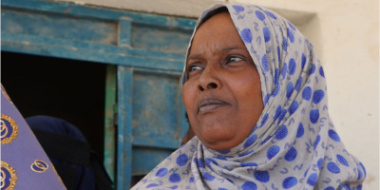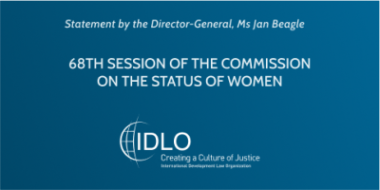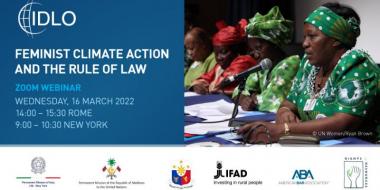Legal Empowerment

Rights mean little if those entitled to them are not aware they exist. Due process is of doubtful value when you are illiterate, or unable to understand the proceedings. Courts are next to worthless for those who cannot afford the bus fare to reach them. Nor should justice be about courts alone. For all these reasons, legal empowerment is crucial. Part of IDLO's bottom-up (or demand side) approach, it involves equipping people with the knowledge, confidence and skills to realize their rights. Even as we work to improve the functioning of justice systems, we strengthen citizens' capacity to press for justice from below.
The rule of law only exists to the extent that it works for all.
Indonesian-Dutch Comparative Justice Policy Workshop
A Comparative Justice workshop held at IDLO's Branch Office in The Hague in December 2015 offered a chance to debate recent developments in legal aid services and access to justice in the host country, the Netherlands, in Indonesia and elsewhere.
Third Myanmar Rule of Law Centre Opens
Myanmar's third Rule of Law Centre, a joint UNDP-IDLO initiative, has opened in Taunggyi, the capital of Shan State. The Centre will promote knowledge of the law, as well as training in skills and values, for legal profess

Myanmar: Rule of Law Center Strengthens Local Justice
“IDLO will help provide the local community with the legal knowledge and skills needed to apply rule of law principles, such as equality and fairness, to local justice issues important to people in Myitkyina," Kartik Sharma, IDLO’s Country Representative in Myanmar told those gathered at an ‘Open House’ event to showcase the Myitkyina Rule of Law Center.

First House of Justice for Paraguay
Paraguay’s first ‘House of Justice’ has opened in the north-eastern department of Concepción -- the first step in a national effort to provide free legal services and easy-access dispute resolution to vulnerable communities.

Global Audiences for IDLO Access to Justice Work

Pages
Key Initiatives
-
 Following the Tunisian revolution of 2011, the new Constitution adopted in 2014 aimed to embed the principle of equality between women and men as well as ensuring the State’s obligation to protect women’s rights. However, despite the reforms to the legal framework in Tunisia to increase protection for women against gender-based violence, justice sector professionals, particularly judges and bailiffs, have limited knowledge, skills and capacity to act as effective gender justice agents, as stipulated by the new Law.
Following the Tunisian revolution of 2011, the new Constitution adopted in 2014 aimed to embed the principle of equality between women and men as well as ensuring the State’s obligation to protect women’s rights. However, despite the reforms to the legal framework in Tunisia to increase protection for women against gender-based violence, justice sector professionals, particularly judges and bailiffs, have limited knowledge, skills and capacity to act as effective gender justice agents, as stipulated by the new Law. -
 Sound legal and policy frameworks are key enablers in ensuring effective prevention, detection, and response to Public Health Emergencies of International Concern and other public health risks. The International Health Regulations, developed in 2005, is a legally binding instrument requiring States to develop core capacities for rapid detection of and response to public health emergencies such as COVID-19.
Sound legal and policy frameworks are key enablers in ensuring effective prevention, detection, and response to Public Health Emergencies of International Concern and other public health risks. The International Health Regulations, developed in 2005, is a legally binding instrument requiring States to develop core capacities for rapid detection of and response to public health emergencies such as COVID-19. -
 IDLO is rolling out a program that aims to secure accessible, quality and sustainable justice services for citizens - particularly those living in rural, poor and other disadvantaged communities. The Community Justice Programme (CJP) supports both state and non-state legal aid, legal empowerment and other justice delivery interventions.
IDLO is rolling out a program that aims to secure accessible, quality and sustainable justice services for citizens - particularly those living in rural, poor and other disadvantaged communities. The Community Justice Programme (CJP) supports both state and non-state legal aid, legal empowerment and other justice delivery interventions. -
 In recent years, Jordan has taken steps and demonstrated political will to reform the justice sector and promote mediation and alternative dispute resolution as means not only to reduce court congestion and shorten the litigation process, but also to guarantee transparent and fair trials. Despite the use of mediation for several years, interest in mediation faded, and it is no longer perceived as a reliable mechanism for dispute resolution. There is therefore a strong need to re-establish mediation as an effective dispute resolution mechanism in the country.
In recent years, Jordan has taken steps and demonstrated political will to reform the justice sector and promote mediation and alternative dispute resolution as means not only to reduce court congestion and shorten the litigation process, but also to guarantee transparent and fair trials. Despite the use of mediation for several years, interest in mediation faded, and it is no longer perceived as a reliable mechanism for dispute resolution. There is therefore a strong need to re-establish mediation as an effective dispute resolution mechanism in the country. -
 Since the revolution in 2011, Tunisia has experienced a period of significant political transition and change culminating in the adoption of a new constitution in 2014, which called for justice reform and protection of women’s rights. However, the practical application of the framework for legal assistance in Tunisia demonstrates the insufficiency of existing relevant mechanisms. Therefore, there is the strong need to empower women to access justice and claim their rights.
Since the revolution in 2011, Tunisia has experienced a period of significant political transition and change culminating in the adoption of a new constitution in 2014, which called for justice reform and protection of women’s rights. However, the practical application of the framework for legal assistance in Tunisia demonstrates the insufficiency of existing relevant mechanisms. Therefore, there is the strong need to empower women to access justice and claim their rights.
Latest Activity
|
Policy Statements
|
|
Évènement
16 mars, 2022 |




